Reviews for May 15th, 2009
Anaglyph Tom
Directed by Ken Jacobs.

This highly experimental film is a manipulation of the film stock of Tom, Tom the Piper’s Son, Thomas Edison’s 8-minute film from 1905, using modern technology to create 3D, flicker and slow motion effects along with other very skillful, imaginative filmmaking techniques. The thin plot involves a bunch of townspeople, including circus performers and a harlequin, gathering and having fun at a fair in their town square. That scene should last just a few minutes, but director Ken Jacobs, who also manipulated the same film stock in the 1969 film Tom, Tom the Piper’s Son and showed off his filmmaking techniques with the experimental film from 2007, Razzle Dazzle, slows down the pace to a very sluggish one and, at times, even pauses the moving images to a complete halt. For some lengthy segments, there’s utter silence which makes for an oddly entrancing experience as you stare at the black-and-white images that pop out at you in 3D. Other times, there’s a baby babbling and even gurgling at one point. After a brief segment that’s back in the 2D format and which, all-of-a-sudden, shows brief archival news footage of Alan Greenspan admitting on C-SPAN about the flaws in his ideology regarding America’s economy which has sunk into a recession right under his nose. Then Jacobs goes back to the 3D format manipulations which now feature the titular character, Tom, the piper’s son, stealing a pig while a bunch of people from the town chase after him. That sequence, of course, gets stretched into a very long duration with the slow motion effects. Admittedly, those who are accustomed to non-experimental films will find it to be pretentious, tedious, dull and headache-inducing. Audience members who have a lot of patience for experimental films and are interested in filmmaking techniques will find Anaglyph Tom to be an entrancing and fascinating experience filled with equally imaginative, wondrous and bizarre sights and sounds. Much like the even more experimental film, The Flicker, it definitely deserves to be studied and thoroughly discussed in film school. Number of times I checked my watch: 3 Opens at the Anthology Film Archives. 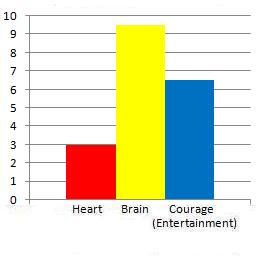
Angels & Demons
Directed by Ron Howard.
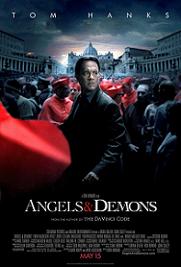
Based on the novel by Dan Brown. Robert Langdon (Tom Hanks), a Harvard symbologist, joins a nuclear scientist, Victoria Vetra (Ayelet Zurer), to find the whereabouts of four kidnapped Preferiti, a.k.a. Cardinal frontrunners in the election for the new Pope after the most recent Pope had died. Ernesto Olivetti (Pierfrancesco Favino), a Vatican inspector, recruits him to use his expertise at deciphering codes and symbols at the Vatican which hopefully would also lead to finding the Preferiti’s sinister kidnapper. The kidnapper threatens to kill a Preferiti one-by-one at each hour until midnight when the Vatican will be wiped out by an explosive device filled with antimatter which he had stolen. As Professor Langdon digs deeper into the clues that he discovers, he uncovers a dark secret lurking in the Vatican’s history which Commander Richter (Stellan Skarsgård), a member of the Swiss Guard who protect the Pope and Cardinals, doesn’t want to be leaked out to the press. Anyone who has seen The Da Vinci Code should already know that Professor Langdon is unafraid to admit that he’s a religious skeptic who relies heavily on science as his guide, which he expresses quite explicitly during a conversation with the Catholic Church’s Camerlengo, Patrick McKenna (Ewan McGregor). The underrated actor Armin Mueller-Stahl shows up as a Cardinal in overseeing the new Pope’s election. Will Professor Langdon be able to use his knowledge to put all the pieces of the puzzle together to finally crack the case while being brave enough to investigate a potential conspiracy in the Vatican? The screenplay by co-writers David Koepp and Akiva Goldsman, has all of the ingredients that you’d expect to find in a Screenwriting 101 script, such as increasingly higher stakes, conflict of interest and clear-cut first and second acts along with a third act that increases the tension with lots of action sequences as Professor Langdon thinks he made a certain shocking realization until he discovers new information that twists his realization around a bit. It’s alright to follow such a standard script formula, but does it have to be so dumbed-down with everything spelled out so neatly for the audience? Where’s subtlety when you need it? Intelligent audience members will eventually find themselves rolling their eyes at how all of the revelations and intricacies become explained too much and get spoon-fed to them. Director Ron Howard does include, though, impressive CGI effects, set design, editing, pacing, cinematography, costume design and sound design which certain provide some thrills along with entertainment for your eyes and ears. At a running time of 2 hours and 18 minutes, Angels & Demons manages to be an often entertaining and intense blockbuster that’s visually stunning, but suffers from a dumbed-down script that doesn’t ultimately trust in the audience’s own intelligence. Number of times I checked my watch: 1 Released by Columbia Pictures. Opens nationwide. 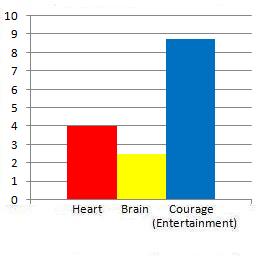
Big Man Japan
Directed by Hitoshi Matsumoto.

In Japanese with subtitles. In this “documentary,” Masaru Daisatou (Hitoshi Matsumoto), a middle-aged father, has the ability to transform into a giant when jolted by a strong electrical current. The people of Japan rely on him to defend themselves from all sorts of huge monsters that attack the city of Tokyo. His superpower has been passed down through six generations and he’s proud of it, but his skills at quickly defeating those monsters, such as Squeezy Baddy, Smelly Baddy and Jumpy Baddy, and impressing his audience have been waning. A TV show crew films his attempts at fighting the monsters and interviews him when he returns to a normal human size. However, the TV show ratings have been plummeting because of his poor fighting skills, so he has no choice but to add more promotional logos throughout his body while he fights which increases the revenue from ad sales. He also has to deal with an impending separation from his wife and to bond with his beloved eight-year-old daughter. When it comes to the monster-fighting sequences, writer/director Hitoshi Matsumoto includes plenty of absurdities and clearly has a lot of fun with the visual gags of how the monsters look and behave. Many of those scenes feel very cheesy and will make you think you’re watching a B-movie, but at least it’s done in a tongue-in-cheek, over-the-top way that’s at least initially amusing and will probably be best enjoyed with a large, rowdy crowd at midnight. During the interviews with the TV crew, that’s when the film becomes less imaginative and unfunny. Matsumoto should have taken the attempts at generating humor from the “documentary” style even further, but, unfortunately, it loses its steam halfway through its lengthy 113-minute running time. Ultimately, Big Man Japan manages to be a cheesy B-movie that’s initially refreshing, funny and a guilty pleasure, but eventually sinks into tedium while its comic energy and imagination concurrently diminish. Number of times I checked my watch: 3Released by Magnet Releasing. Opens at the Cinema Village. 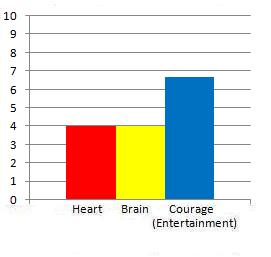
The Brothers Bloom
Directed by Rian Johnson.
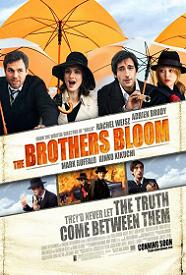
Bloom (Adrien Brody) and Stephen (Mark Ruffalo) have been practicing the art of conning people since they were children. Stephen designs a cunning 15-step plan on how to do the perfect con which has always worked for them for the past 25 years. Now into his forties, Bloom has lost his passion and enthusiasm for conning and wants to escape from it. However, Stephen convinces him to do just one more con job which would have them joining Bang Bang (Rinko Kikuchi) to con a wealthy heiress, Penelope Stamp (Rachel Weisz). They’re after her inheritance, so it’s up to Bloom to get to know her so that they can get easier access to that large sum of money. The con doesn’t go precisely as planned, especially as Bloom gets his romantic feelings toward Penelope mixed up in it. Writer/director Rian Johnson has woven a very whacky plot filled with imagination along with a variety of dark, dry and slapstick comedy. What makes it an above average comedy, though, is that all of its characters are well-developed, lively and interesting. Some of the humor does fall flat with poor comic timing, but, for the most part, there are more hits to be found than misses. Each of the actors and actresses, especially the underrated Rachel Weisz who radiates abundant charisma, seems to be having a great time in their roles throughout and it’s a real pleasure to watch them onscreen even when they’re lying and deceiving one another. Simply put, their comic energy feels contagious for audience members, especially if you don’t mind just sitting back and having a great time while checking your brain at the door and suspending a lot your disbelief. While comparisons to other comedies about cons, such as Paper Moon, or offbeat comedies such as The Royal Tenanbaums, are initially inevitable, you’ll nonetheless still find plenty of surprises and unpredictable moments here. At a running time of 113 minutes, The Brothers Bloom manages to be a brilliant, refreshingly original comedy that’s delightfully zany and inventive. Number of times I checked my watch: 1 Released by Summit Entertainment. Opens at the Angelika Film Center and AMC Loews Lincoln Square 13. 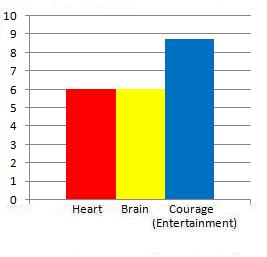
Jerichow
Directed by Christian Petzold.
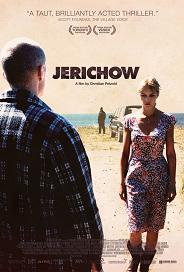
In German with subtitles. After the death of his mother and being dishonorably discharged from the German army, Thomas (Benno Fuermann) moves into the vacant house of his mother located in the small town of Jerichow in Germany. He needs to find a job to pay off his mother’s debts that he has incurred, so he he no choice but to work as a cucumber harvester, the only job that’s immediately available. One day, as he returns from work, he witnesses a car sliding off the road, decides to help and agrees to tell the police that he was driving rather than the drunk driver himself, Ali (Hilmi Sozer), a Turkish-German businessman who owns many fast food joints around tow. The two men gradually become friends and, when the police end up suspending Ali’s license after all, he hires Thomas to take his place as the driver for his company. Ali introduces him to his sexy, blonde wife, Laura (Nina Hoss), and, soon enough, they’re having an affair behind his back. What might Ali do if he finds out that his wife is cheating on him with Thomas? Would it be reasonable for Laura to simply leave Ali to be with Thomas who’ll struggle to financially support her? As the plot. similar to that of The Postman Always Rings Twice, progresses, you learn more and more about Laura’s relationship with Ali and what makes her want to cheat on him in the first place. There’s more to her than meets the eye and, thanks to the convincingly strong performance by Nina Hoss, you’re able to grasp that Laura suffers from loneliness, insecurity and emotional instability. Writer/director Christian Petzold wisely builds the suspense gradually while there’s always a foreboding sense of something dark and sinister that can happen to any of the characters if Laura’s secret love affair with Thomas comes out into the open. Location of the film also serves as a character, so-to-speak, that becomes integral to the plot later on. For example, there’s a steep cliff overlooking a picturesque beach where Ali, Laura and Thomas spend time together. Fortunately, Petzold keeps the film focused and doesn’t resort to any over-the-top scenes or gimmicks as a means of entertainment. At a running time of 93 minutes, Jerichow manages to be a taut, character-driven and intelligently crafted thriller with a strong and radiant performance by Nina Hoss. Number of times I checked my watch: 1 Released by The Cinema Guild. Opens at the Film Forum. 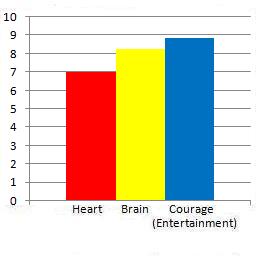
Management
Directed by Stephen Belber.

Mike Cranshaw (Steve Zahn), a lonely 38-year-old man, works at a motel in Arizona that his parents, Trish (Margo Martindale) and Jerry (Fred Ward), own. One day, Sue Claussen (Jennifer Aniston), a sales representative, checks into the motel for a business trip and Mike decides to strike up a conversation with her, which leads to them awkwardly flirting with one another and then briefly having sex in the laundry room before she leaves back to Maryland the next day. Mike stalks her all the way to Maryland and shows up at her workplace there in hopes of continuing their relationship. She, however, doesn’t flirt back and says that she has gotten back together with her ex-boyfriend, Jango (Woody Harrelson), an ex-punk rocker who’s now an organic yogurt mogul living in Aberdeen, Washington. Sue would prefer that he return to Arizona, but instead he continues to stalk her by going to Aberdeen, where he tries to find a job. Luckily, he meets a strange, yet kind employee, Al (James Liao), at a Chinese restaurant run by his parents. Not only does he give him a job, but lets him sleep in the restaurant’s basement. In a creepy, but outrageously funny scene, Mike skydives out of an airplane and lands in Jango’s pool when Sue happens to be sunbathing on the poolside. Will Mike convince her to leave her passive-aggressive boyfriend for him or is he merely quixotic? He certainly comes across as desperate and crazy, so maybe Sue should avoid both him and Jango and find a totally different guy who’s mentally stable. The screenplay by writer/director Stephen Belber unevenly blends drama, comedy and romance with mixed results. Mike and Sue don’t really have enough chemistry onscreen to take their romantic relationship with one another seriously. Thanks to Steve Zahn’s sensitive performance as Mike, though, you’re able to somewhat grasp that he’s a genuinely sweet guy who means well, but who just doesn’t always know how to project himself in a non-creepy, non-desperate way. It takes a sensitive screenplay to find the right balance between juggling the right amounts of comedy, drama and romance. Belber should have either taken the comedy further, made the drama more engrossing or the romance sweeter and more authentic. At a running time of 93 minutes, Management manages to be mostly compelling and occasionally sweet and funny thanks to its terrific cast, but it combines comedy, drama and romance awkwardly and unevenly while leaving you feeling somewhat underwhelmed. Number of times I checked my watch: 2 Released by Samuel Goldwyn Films. Opens at the Angelika Film Center, AMC Loews 19th St., City Cinemas 1, 2, 3, AMC Empire 25 and AMC Loews 84th St. 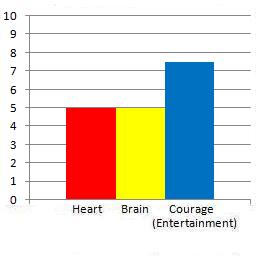
Summer Hours
Directed by Olivier Assayas.
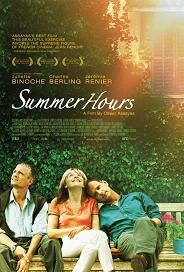
In French with subtitles. Adrienne (Juliette Binoche), a designer living in New York, and her siblings, Frédéric (Charles Berling), a writer and economist, and Jérémie (Jérémie Renier), a business man, gather together, along with their wives at the bucolic retreat of their elderly mother, Hélène (Edith Scob), in France. Adrienne’s boyfriend, James (Kyle Eastwood) also shows up from New York eventually. The large house is filled with artworks that Hélène’s brother, now deceased, had collected, so she cherishes them as much as he had, especially since they had a strong bond together and that he himself was an artist. She tells Frédéric, separately, that she wishes to have the artworks displayed in a museum after her death. When she finally passes away, Jérémie has relocated his business to China and Adrienne plans to marry her boyfriend. Both Adrienne and Jérémie want to sell the house as well as the artworks in it despite that Frédéric would like to respect their mother’s wishes by keeping the house and preserving the priceless artworks. Soon enough, there’s sibling rivalry that leads to arguments and the rekindling memories from their experience at the house as a family. In a poorly developed subplot, Frédéric’s teenage daughter, Sylvie (Alice de Lencquesaing) , shows up late in the film and her father hopes that the house remains intact and unsold so that the new generation will have some sort of connection with the old one. Unfortunately, writer/director Olivier Assayas fails to generate any palpable dramatic tension while too many scenes go on and on with characters talking a lot, but actually saying very little. Although the characters seem quite likable more often than not, it’s difficult to truly care about what they’re thinking and feeling, so you’re left feeling cold and distant from them rather than feeling warm and engrossed. None of the actors or actresses gets a chance to shine in their roles, even when it comes to Juliette Binoche who’s usually radiant and charming, but simply doesn’t have much to sink her teeth into here. At a running time of 102 minutes, Summer Hours has exquisite cinematography and an initially intriguing plot, but that doesn’t compensate for its bland and meandering screenplay that lacks palpable dramatic tension and fails to bring any of its characters to life. Number of times I checked my watch: 5 Released by IFC Films. Opens at the IFC Center and Lincoln Plaza Cinemas. 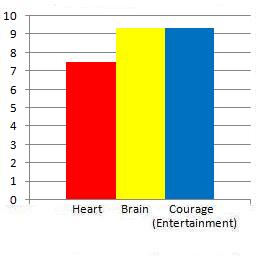
Main Page
Alphabetical Menu
Chronological Menu
______________________________________________________
|














